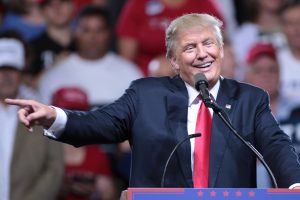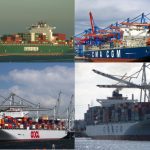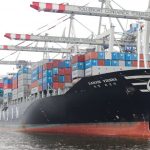What Does Trump Presidency Mean for Shippers?

President-elect Donald Trump – pic by: Gage Skidmore
Donald Trump, seemingly despite all polls and predictions, has been elected the next president of the United States, and the impact his presidency could have on international shipping is, as he would say, huge.
There is much uncertainty when it comes to what President-elect Trump’s policies will actually be, but the word being used to sum up the international trade policy from his platform is protectionism.
In his acceptance speech, President-elect Trump said, “… we will get along with all other nations willing to get along with us. We will have great relationships. We expect to have great, great relationships. We will double our growth and have the strongest economy anywhere in the world….”
While most think the kind of growth numbers Trump promises are not achievable, his focus on turning around the U.S. trade deficit has been a clear throughout his campaign. President-elect Trump wants to see the U.S. increase production and export more than import. In fact, international trade and outsourcing is something he has repeatedly talked about as hurting or--with more Trump-like language--destroying American manufacturing.
Importing at the level the U.S. has in the global economy does not appear to be in the best interest of the U.S. according to the President-elect, and he told the world in his speech that “we will always put America’s interests first.” Through his campaign trail, Trump spoke of tariffs on imports and renegotiating or pulling out of trade deals, all of which has made the international shipping community around the world a bit nervous after his election win.
The worry of slowed trade with the U.S. is evident from the immediate stock drop of the world’s largest ocean carrier by capacity, AP Moller-Maersk upon Trump’s election.
An American Shipper article highlights international trade moves President-elect Trump said he would make while on the campaign trail and reactions from players in the international shipping industry:
[Trump] said he would significantly raise import tariffs to protect American jobs, withdraw from the Trans-Pacific Partnership Agreement negotiated by President Obama and waiting congressional approval, and opened the possibility of discarding the North American Free Trade Agreement if Mexico and Canada don’t renegotiate terms that are more favorable to the United States.A pullback in U.S. import and export activity would present yet another challenge for the shipping and airline industries, as well as other transport companies that are struggling because of a slowdown in trade and massive overcapacity. Shares of A.P. Moller-Maersk A/S, the owner of leading container shipping line Maersk, fell on the Danish stock exchange amid fears that protectionism could proliferate. Analysts and economists said new protectionist policies in the United States could spread and diminish prospects for a recovery in trade….
Lars Jensen, chief executive officer and a partner at SeaIntelligence Consulting in Copenhagen, said if a Trump administration delivers on protectionist measures, “then clearly that is negative for shipping both directly because you will have less shipment into the U.S., and indirectly there is a risk if a major country starts down a protectionist route for a domino effect of other countries also becoming protectionist.”
The worry of protectionist policies by those around the world are clear. The most obvious effect on shippers of such policies as raising tariffs is an increase in the cost of importing. However, most of President-elect Trump’s talk of tariffs does not indicate duty increases across the board on U.S. imports.
With his focus on U.S. manufacturing, the biggest tariff threats Trump made on his campaign trail was to U.S. producers that would move production outside of the country, especially U.S. auto manufacturers that have moved and would move more plants away from key electoral states like Ohio and Michigan to Mexico.
In fact, Trump went in to Michigan and directly threatened Ford with taxes on cars, trucks, and parts they would manufacture in Mexico instead of U.S. cities like Detroit. The Detroit News quoted his remarks at the time:
“Let me give you the bad news: Every car, every truck and every part manufactured in this plant that comes across the border, we’re going to charge you a 35 percent tax,” Trump said. “They are going to take away thousands of jobs.”
“Detroit needs a lot of help — and it certainly needs a lot of help when factories are closing to move to Mexico — when you are closing up your car factories in order to build the same factory in Mexico, meaning a modern version of it in Mexico. We just can’t have that. It just can’t happen, and we have to stop it.”
Such unprecedented words from a candidate for president undoubtedly came as music to the ears of many voters in Detroit, Flint, and similar cities that have suffered from the loss of jobs by auto plants shutting down and moving to places where labor is cheaper, like Mexico.
Much has been made of Trump’s comments on Mexico, but for shippers--especially importers--Trump’s talk on China may be the higher concern. The American Shipper article summarizes it nicely as follows:
Trump has said he will direct his Secretary of Commerce to identify every violation of trade agreements and use every legal means to end them. He has also said he plans to label China as a currency manipulator and instruct his Trade Representative to bring trade cases against China, both in the United States and the World Trade Organization (WTO).
…
Trump also said that if China doesn’t stop taking advantage of trade rules and stealing intellectual property, he would hike tariffs on Chinese products by as much as 40 percent.
Repeatedly, Trump has said that things like China is beating, even killing, the U.S. when it comes to international trade, and he plans to change that. Increased tariffs on goods from China and increased trade cases against China could significantly affect U.S. shippers who import from China.
There has already been worry from shippers about U.S.-China tension over conflict in the South China Sea.
Further tension, many shippers worry, could interrupt trade deals with partners in China. However, it is the uncertainty of what President-elect will actually do in terms of international relations that creates the most anxiety.
Billionaire investor and Trump advisor Wilbur Ross is trying to allay fears by clarifying that Trump does not plan to simply drop a unilateral 40% or 45% tariff increase on imports from China. TradeWinds reports:
Ross, who is both a shipping investor and a senior trump policy advisor, told the annual Marine Money Ship Finance Forum that fears over the Republican’s shock victory were overblown.
…Much of the worry over Trump’s approach stems from what Ross called “a misquote” suggesting he would “put a 45% tariff on everything coming out of China.”
Trump’s actual remarks were more nuanced, Ross said, and referred to a potential tactic in the event that Chinese currency is undervalued by as much as 45% and the country is unwilling to negotiate its trade imbalance with the US.
“Then it may become necessary to threaten them with a 45% tariff,” Ross said. “That’s one negotiating strategy. It’s not the words of a madman who’s going to throw tariffs on everything.”
All along, Trump has criticized the ability of leaders in government to negotiate with other countries when it comes to issues like international trade, even calling them stupid at times. Trump certainly has emphasized his ability to negotiate, and much of his tariff talk is likely designed to create leverage for international negotiations.
Shippers should take a deep breath and know two things:
1. No president has ever implemented all the things he promised on the campaign trail. Not Obama, not Bush, not Clinton…
2. International trade is not coming to an end. President-elect Trump comes from the world of business, not the world of politics. He is not going to cease all trade.
What are your thoughts on President-elect Trump’s likely effects on international trade and shipping? Share them in the comments section below.




